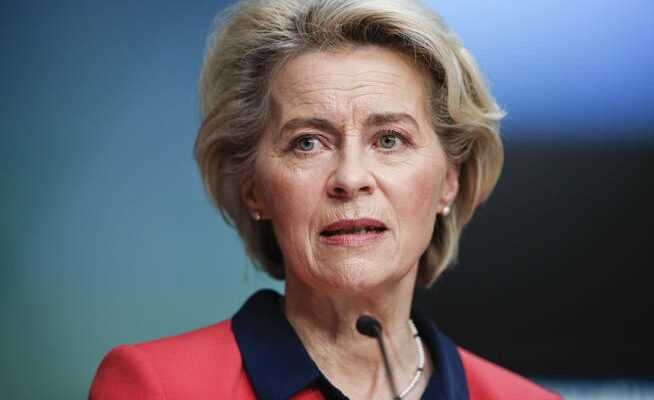For weeks there had been speculation about how the EU would react in the event of Russian aggression against Ukraine. Now the commission has disclosed the far-reaching punitive measures against Moscow.
EU Commission President Ursula von der Leyen speaking to the heads of state and government last Friday.
Ursula von der Leyen had set the bar high. “If Vladimir Putin starts a war,” said the EU Commission President on German television on Sunday evening, “we will respond with the most powerful lever we have: economic and financial sanctions, because the economy is Russia’s weak point.”
The most powerful lever? Is Russia excluded from the Swift international payment system? Or just the targeted sanctioning of some Russian banks?
No details, just hints – that was the line of the commission head, agreed with many western capitals. The only thing von der Leyen wanted to reveal to the public was that Russia would be “practically cut off from the financial markets”. The package with the punitive measures against Moscow is ready in case of cases, it was said in Brussels.
“Unprecedented sanctions package”
But when would that happen? Even if the Kremlin recognized the separatist areas as independent states? Or only when Russian troops actually invaded eastern Ukraine? The government in Kiev pleaded with the Europeans that the sanctions should be imposed as a deterrent before an offensive. However, this proposal did not find a majority at a meeting of EU foreign ministers on Monday.
Until the evening, some EU states had speculated that the threat of the “unprecedented sanctions package” would discourage Putin from going to arms. This dream was only over after the Russian President had signed the decrees recognizing “Luhansk” and “Donetsk” as “people’s republics” and declared himself in a television speech.
The EU foreign representative Josep Borrell immediately announced that he would convene the foreign ministers of the member states again on Tuesday. Before their special meeting in Paris, which was supposed to discuss the EU’s Indo-Pacific strategy, the draft sanctions leaked out.
It is planned that several hundred people and companies in Russia will be punished with entry bans and the freezing of accounts in Europe. The 350 or so members of the Duma who voted for Russian recognition of the so-called People’s Republics are particularly affected, as are banks that do business in eastern Ukraine.
Secondly – and this is much more explosive – trading in Russian government bonds on western financial markets is to be suspended. The reasoning behind this is that Moscow will then no longer be able to refinance its debts on international markets. Russia’s financial sector would be largely excluded from international financial transactions. Almost all trade with the separatist areas is also to be banned.
The EU Commission confirmed the main features of the package on Tuesday. The aim of the sanctions is “to limit the financing of escalating and aggressive measures” and “to let those responsible clearly feel the economic consequences of their illegal and aggressive actions”.
Eric Mamer, the Commission’s chief spokesman, said in Brussels that Russia had chosen the path of escalation. “We must now make sure to stop Russia. We have to continue to find a diplomatic path, but first we have to react.”
Praise for stopping Nord Stream 2
If the Commission has its way, things could get even worse. Namely, when Russia lets its troops cross the so-called contact line between the separatist areas and the rest of Ukraine. A second round of punitive measures, which have not yet been defined in detail, could then come into force, which is likely to be directed against the entire Russian economy and against the oligarchs. It cannot be ruled out that Putin would then also be included on the EU sanctions list.
However, the most drastic measure came from Berlin on Tuesday: German Chancellor Olaf Scholz surprisingly announced at noon that he would suspend the approval process for the Nord Stream 2 Baltic Sea pipeline. This is initially only a symbolic act, since the gas pipeline is not yet in operation. In Brussels, where many EU diplomats and MEPs had long branded Nord Stream 2 as Russia’s “geo-strategic project”, the announcement was nonetheless praised.
According to the EU Commission, the gas supply on the continent is secure for the time being. One is not in a situation where, in the event of supply disruptions, one would be “without gas from one day to the next,” said a spokesman. The gas storage tanks are currently about 30 percent full. That didn’t stop Deputy Chairman of Russia’s National Security Council, Dmitry Medvedev, from stoking fears of high energy prices. The former Prime Minister blasphemed on Twitter: “Welcome to a world where Europeans will soon be paying 2,000 euros per cubic meter of gas.”
